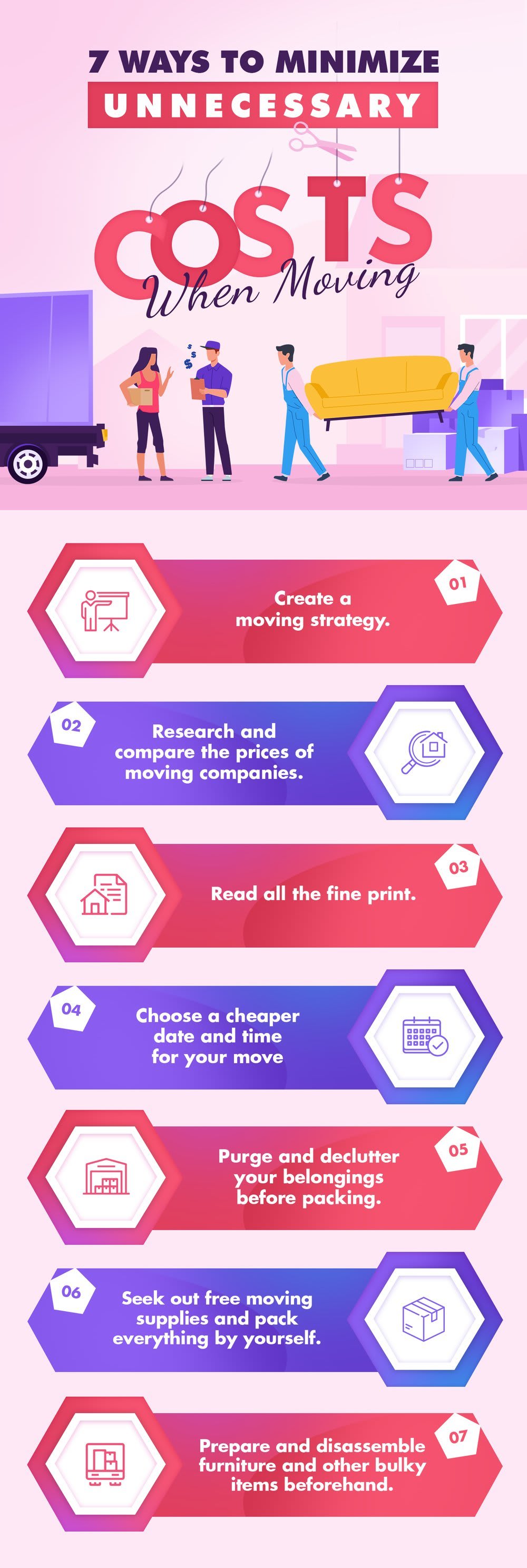When Moving Expenses Can Get Out of Control

1. Create a Moving Strategy
One of the smartest ways to reduce costs when moving is organization. As soon as you get to know you’re going to move, list down all the things you’re supposed to do. Go through your rooms and jot down what you have and what you’re taking with you. If you’ve decided to use a professional moving company, allow enough time to find the best movers and negotiate with them to avail of their services at affordable costs. Lastly, ensure you have a backup plan in place because there is always a chance that your timeline and move-in date could go awry at the last minute.
2. Research and Compare the Prices of Moving Companies
You don't want to wait until the last minute to look for movers, as you may end up accepting any price quote they give you due to being in a hurry. Be critical and do your research about the reliability of each mover before booking them. Be mindful of red flags, especially those who offer low deals that are too good to be true. Since no two movers quote similar prices, it’s preferable to get in-home estimates from at least three companies.
Make sure that the relocation expert performs on-site and in-person cost estimates to make them as accurate as possible. Then compare the moving quotes you receive in terms of these three things: price, services, and terms and conditions. Once you select the right mover that fits your needs and budget, don’t be afraid to ask about discounts and negotiate for a lower price.
3. Read All the Fine Print
Once you've decided which professional moving company you’re going to hire, make sure to examine the movers’ contracts carefully. Some movers are notorious for hidden fees, so be vigilant and read all the fine print. Take a long, hard look at the extra fees and add-ons attached to your estimate to make sure you’re not being overcharged for something you don’t need. Likewise, don’t forget to consider your insurance and liability options carefully.
4. Choose a Cheaper Date and Time for Your Move
Another good cost-saving technique when relocating is to schedule your move during the off-season, if possible. Summer tends to be the busiest season for moving when demand for movers is highest, especially in the months of June, July, and August. Likewise, movers quote high prices during weekends and month ends since many people move during this period due to being off from work and end of lease or rent contracts. So if you can choose to move during the off-peak season or midweek or mid-month days when demand is typically the lowest, you can avoid paying unnecessarily high charges. Also, movers will be able to completely focus on your relocation job without being in a hurry to move on to the next one.
5. Purge and Declutter Your Belongings Before Packing
If you really want to avoid unnecessary costs when moving, follow this rule: the fewer things you have to take along with you, the less you'll have to pay. If you declutter before moving, you will also need fewer packing boxes and supplies and cut down on costs if you need to store your items. So get rid of unwanted items unworn clothing, out-of-date electronics, furniture that won’t fit your new space, etc. as early as possible to make your life so much easier on moving day. Choose the items suitable for resale, then decide whether to have a local garage sale or sell them online. For those items that don’t sell donating is the way to go.
6. Seek Out Free Moving Supplies and Pack Everything Yourself
Moving supplies, including boxes, tape, and bubble wrap, aren't cheap. Their cost can add up if you don’t plan ahead and get creative on where you source them. Since you have assessed your belongings, see if there are items in your home that you can use to pack some of your stuff. Using soft furnishings, blankets, towels, clothing, and any other materials to protect your items doubles up as smart packing instead of wasting money on bubble wrap that you are just going to throw away. You can also seek free moving supplies from various stores, online marketplaces, community groups, and friends. Lastly, you should be able to pack most of your things by yourself. If you’re going to consider professional packing services, it would be cheaper if it would only be for special and valuable items such as pianos, antique furniture, paintings, etc.









